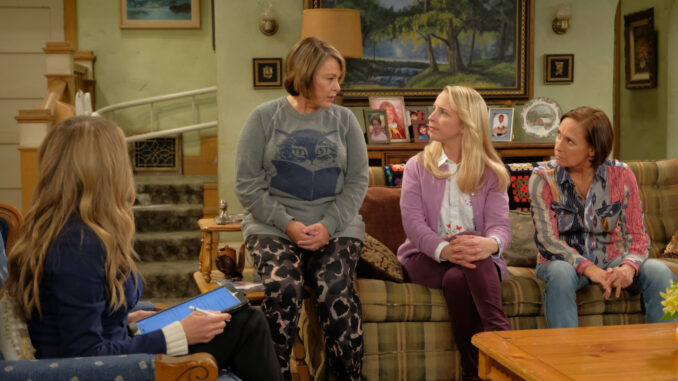
As a working-class viewer of Roseanne, its revival, and The Conners, I was struck by how much killing off Roseanne brought the show back to its roots. When I first watchd Roseanne in college, the show’s appeal eluded me. The episode we studied as part of TV history, season 2, episode 8, “Sweet Dreams,” is something of an anomaly in the show’s canon. It’s an odd, semi-surreal dream/ fantasy episode where Roseanne’s wish for a peaceful bath is repeatedly interrupted by the rest of the family. When I rewatched Roseanne years later, the episode made more sense in retrospect.
While working multiple minimum wage jobs in the years after I finished college, Roseanne and its spinoff, The Conners, became more relatable. The Conners’ cast of characters was a family who worried about paying the rent, who didn’t know how their next paycheck would stretch, and who relied on government assistance from time to time. Compared to the fantasy world of Modern Family’s uber-rich protagonists, Roseanne’s main characters lived in something that resembled observable reality. I realized this when season 9 made Roseanne’s greatest mistake and gave the Conners over $100 million overnight thanks to a lottery win.

I was crushingly disappointed to discover that Roseanne didn’t care about income inequality or blue-collar struggles now that she was busy complaining about disrespectful grandchildren.
The reason that Roseanne season 9 is one of the most hated sitcom seasons in TV history is pretty easy to discern. From its inception, Roseanne was about the everyday struggles and little victories that make up working-class family life. Sometimes, an entire episode centered on Roseanne trying to get five minutes to herself after a day of raising her kids and juggling multiple jobs. Roseanne could mine comedy and pathos out of difficulties that millions of working people face every day, and many of these were hardships that simply didn’t exist in the upper-middle-class utopia of The Cosby Show.
Money woes were Roseanne’s oldest struggle and the reason this story didn’t get old is that it never stopped resonating. When Roseanne returned to screens in 2017’s revival, I was balancing two jobs after struggling with unemployment for over a year. I was excited to see how the new season would tackle worsening income inequality, the gig economy, and other issues that affect the working class in the twenty-first century. As such, I was crushingly disappointed to discover that Roseanne didn’t care about income inequality or blue-collar struggles now that she was busy complaining about disrespectful grandchildren.

2017’s Roseanne spent more time complaining about TV shows starring people of color than a lack of access to affordable healthcare.
As a longtime viewer, I felt betrayed by the Roseanne of 2017’s revival. Roseanne’s justified anger at unfair working conditions, inept managers, corporate corruption, and government bureaucracy was replaced by complaints about teenagers disrespecting their elders and Jackie insulting the president. The revival made its resilient heroine a whiny, self-centered sad sack, resulting in a reboot that alienated me from a show that once had something to say. As The New Yorker’s Emily Nussbaum noted, 2017’s Roseanne spent more time complaining about TV shows starring people of color than a lack of access to affordable healthcare.

As someone with bills to pay, this felt completely out of touch and alien to me. Darlene was practically Roseanne’s replacement in season 10 as the single mother faced struggles, in both parenting and her professional life, that felt recognizable. Meanwhile, Roseanne herself was living in another world. This happened before, when season 9 made the Conners rich. However, it was worse in the revival. This time, Roseanne’s family was still struggling with grounded problems I recognized from real life, from divorce to unemployment, but all the heroine’s screen time was devoted to complaining about Gen Z talking points.
As the Youtuber Jose noted, Roseanne’s revival was as much an insult to the original series as it was to the viewer. In Roseanne season 6, episode 11, “The Driver’s Seat,” Roseanne broke down after hitting her young son. She tearfully admitted that her father physically abused her in a raw, daring moment of heartbreaking vulnerability from an imperfect parent. In Roseanne’s season 10 revival, Roseanne dunked her granddaughter’s head in a sink full of dirty dishes to the braying delight of a studio audience. Watching this, I wasn’t particularly amused or offended, but I was disappointed and embarrassed.
Although all of Roseanne season 10 was a shadow of the show’s glory days.
